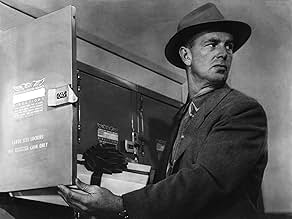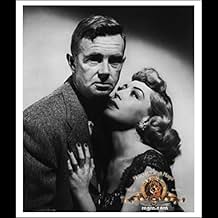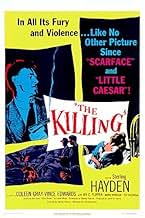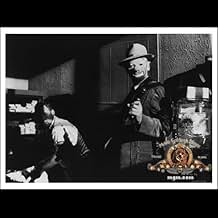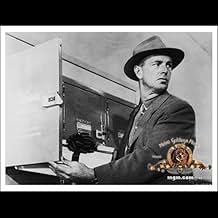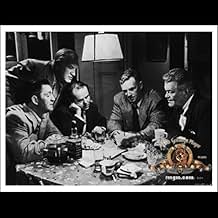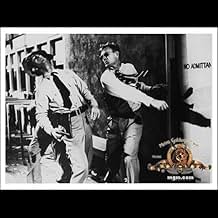Johnny Clay forma uma equipe de cinco homens para planejar e executar um ousado assalto em uma pista de corridas.Johnny Clay forma uma equipe de cinco homens para planejar e executar um ousado assalto em uma pista de corridas.Johnny Clay forma uma equipe de cinco homens para planejar e executar um ousado assalto em uma pista de corridas.
- Direção
- Roteiristas
- Artistas
- Indicado para 1 prêmio BAFTA
- 1 indicação no total
Ted de Corsia
- Patrolman Randy Kennan
- (as Ted DeCorsia)
Elisha Cook Jr.
- George Peatty
- (as Elisha Cook)
Joe Turkel
- Tiny
- (as Joseph Turkel)
- Direção
- Roteiristas
- Elenco e equipe completos
- Produção, bilheteria e muito mais no IMDbPro
Avaliações em destaque
The story of a meticulously-planned race track hold-up is a stunner in every minute you watch it, and the film's progressive use of a partly documentary style has often been acclaimed as uniquely supporting the dramatic goings-on. It definitely put a modern touch to the somewhat out-of-fashion film noir in 1956, but still greatly relied on its basic rules.
A fine new note was the neat distinction between the gang's members' motives, ranging from repaying underworld debts (De Corsia) and hope of offering a better life for his ill wife (Sawyer) to the vain ambition of pleasing his vamp wife by doing something special (Cook).
Despite the film's qualities, Kubrick's treatment of the women's rôles seems more than old-fashioned today. Women here are either the homely and sweet type (Coleen Gray) or the Bette-Davis-eyed and cherchez-la-femme type (Marie Windsor). Both are accordingly taller or smaller than their respective partners by a head.
I should like to mention one of my favourite pans: that's when the bald philosopher-catcher walks up to Joe Sawyer's bar. Lucien Ballard's camera follows him all across the crowded tote hall, a take which must have been very difficult to organize and shoot. Later, the scene is repeated with Sterling Hayden.
This motion picture is also a monument for the great histrionic art of Elisha Cook, Jr., in a stand-out performance as the born loser. (German dubbing gives him the apt voice of Stan Laurel's speaker Walter Bluhm.) This little man never just did his job in unnumerable supporting rôles but has rendered effective homage to the tragic figure on the silver screen more than any other (non-comical) character actor I can think of. Regardless of his versatility in lots of different films, his impersonations of a likeable man who is doomed to fail make him unforgettable: take his lethal parts in "Phantom Lady" (1944), "Shane" (1953) or the likes, the audience's sympathy was always with this fine actor.
A fine new note was the neat distinction between the gang's members' motives, ranging from repaying underworld debts (De Corsia) and hope of offering a better life for his ill wife (Sawyer) to the vain ambition of pleasing his vamp wife by doing something special (Cook).
Despite the film's qualities, Kubrick's treatment of the women's rôles seems more than old-fashioned today. Women here are either the homely and sweet type (Coleen Gray) or the Bette-Davis-eyed and cherchez-la-femme type (Marie Windsor). Both are accordingly taller or smaller than their respective partners by a head.
I should like to mention one of my favourite pans: that's when the bald philosopher-catcher walks up to Joe Sawyer's bar. Lucien Ballard's camera follows him all across the crowded tote hall, a take which must have been very difficult to organize and shoot. Later, the scene is repeated with Sterling Hayden.
This motion picture is also a monument for the great histrionic art of Elisha Cook, Jr., in a stand-out performance as the born loser. (German dubbing gives him the apt voice of Stan Laurel's speaker Walter Bluhm.) This little man never just did his job in unnumerable supporting rôles but has rendered effective homage to the tragic figure on the silver screen more than any other (non-comical) character actor I can think of. Regardless of his versatility in lots of different films, his impersonations of a likeable man who is doomed to fail make him unforgettable: take his lethal parts in "Phantom Lady" (1944), "Shane" (1953) or the likes, the audience's sympathy was always with this fine actor.
'The Killing' has been overshadowed by Stanley Kubrick's subsequent better known and better made movie masterpieces. Films like 'Dr. Strangelove', '2001' and 'A Clockwork Orange' are much more flamboyant and intellectually exciting than this early hard boiled crime thriller, but for my money it is still one of his most entertaining movies, and in its own modest way just as brilliant as his more talked about films. 'The Killing' is still one of the greatest crime thrillers ever made, and one which influenced many film makers working in this genre, not the least of which Quentin Tarantino, who obviously worships this picture, and used its innovative structure as major inspiration for 'Pulp Fiction'. Kubrick wrote 'The Killing's script as well as directing, but made the smart move of asking "the Dime Store Dostoevski" Jim Thompson, author of pulp classics like 'The Killer Inside Me' and 'The Getaway' to supply the fresh and memorable dialogue. Sterling Hayden, who later achieved screen immmortality as General Jack D. Ripper in 'Dr Strangelove', is perfect as ambitious small time crook Johnny Clay. He is surrounded by an almost flawless supporting cast. I qualified that because I wasn't totally convinced by Coleen Gray who plays Johnny's girlfriend. However she only really has one scene, and the rest of the cast more than makes up for her. Especially memorable are the mis-matched husband and wife played by Elisha Cook, Jr ('The House On Haunted Hill') and the sultry Marie Windsor (noir classic 'Narrow Margin'). Their scenes together are simply terrific. Also noteworthy are the two scenes featuring legendary crazy Timothy Carey ('The Killing Of A Chinese Bookie'). Carey was one of the most extraordinary performers to set foot in front of a movie character, and is unforgettable. Kubrick obviously thought highly of him as he subsequently cast him in his anti-war classic 'Paths Of Glory', a move which antagonised the movie's star Kirk Douglas. Even if 'The Killing' didn't feature such a strong performance from Sterling Hayden it would be worth watching just to catch Cook, Windsor and Carey. On top of that you have some other great actors such as Vince Edwards, an innovative script, hip dialogue and some brilliant directorial touches. This exciting heist movie can't be recommended highly enough, it's a real treat for film buffs. A brilliant film that still packs a punch after almost fifty years, something I doubt you will be saying about many movies currently showing in today's theatres. 'The Killing' is a super cool suspense movie and not to be missed!
The Killing is a film whose legacy can still be seen in many films today. This film is not only Stanley Kubrick's first acclaimed film, but it is also credited with inventing the concept of non-linear story telling for the film industry. Some recent films that have used this technique are Reservior Dogs, Pulp Fiction, Go, Wonderland and The Usual Suspects.
The story deals with a motley crew of assorted criminals, inside men, and average joes just looking to get their hands on a large sum of money by stealing it from a racetrack. Sterling Hayden plays Johnny Clay, a hardened criminal who just finished serving a five-year prison sentence. He is the ringleader of the bunch who is determined to only go for the big heists from now on. He figures they can put you away for stealing ten dollars as easily as ten million, so what have you got to lose? The rest of the crew are mostly average people with average problems, as Clay explains early on. Some of them work at the track. One is a crooked cop. Two are hardened criminals added at the last minute to cause diversions. Everything has been timed and planned out to the letter. Of course in a film like this, things never go as planned. It wouldn't be entertaining if they did.
The killing was made on a budget of well below half a million dollars, and it shows. The film looks cheap at times, but the story is more than enough to make you forgive its financial shortcomings. The acting is nothing too special. Hayden is strong and resourceful as Johnny Clay, but he's pretty wooden. Elisha Cook Jr. is pretty good as a hen-pecked husband who is taking part in the scheme to impress his high-maintenance wife. If this film were re-cast today, you'd have to think of William H. Macy to play this character. Timothy Carey is always memorable, even with such a small part like the one he has here. Such a strange-looking guy! He gets the most interesting assignment of all the people in on the heist.
You can really tell this was made fifty years ago. Even though there are hardened criminals and low-lifes in nearly every scene, nobody ever says the F-word! There is, however, a fairly gory shootout in one scene which you normally didn't find in films back then. The killing was ahead of its time in more ways than one, I guess. Please be sure to check this one out! 8 of 10 stars.
The Hound.
The story deals with a motley crew of assorted criminals, inside men, and average joes just looking to get their hands on a large sum of money by stealing it from a racetrack. Sterling Hayden plays Johnny Clay, a hardened criminal who just finished serving a five-year prison sentence. He is the ringleader of the bunch who is determined to only go for the big heists from now on. He figures they can put you away for stealing ten dollars as easily as ten million, so what have you got to lose? The rest of the crew are mostly average people with average problems, as Clay explains early on. Some of them work at the track. One is a crooked cop. Two are hardened criminals added at the last minute to cause diversions. Everything has been timed and planned out to the letter. Of course in a film like this, things never go as planned. It wouldn't be entertaining if they did.
The killing was made on a budget of well below half a million dollars, and it shows. The film looks cheap at times, but the story is more than enough to make you forgive its financial shortcomings. The acting is nothing too special. Hayden is strong and resourceful as Johnny Clay, but he's pretty wooden. Elisha Cook Jr. is pretty good as a hen-pecked husband who is taking part in the scheme to impress his high-maintenance wife. If this film were re-cast today, you'd have to think of William H. Macy to play this character. Timothy Carey is always memorable, even with such a small part like the one he has here. Such a strange-looking guy! He gets the most interesting assignment of all the people in on the heist.
You can really tell this was made fifty years ago. Even though there are hardened criminals and low-lifes in nearly every scene, nobody ever says the F-word! There is, however, a fairly gory shootout in one scene which you normally didn't find in films back then. The killing was ahead of its time in more ways than one, I guess. Please be sure to check this one out! 8 of 10 stars.
The Hound.
There's little to fault in Stanley Kubrick's classic robbery tale. The acting is first-rate with Marie Windsor, as Mrs. Peaty, a sarcastic stand-out. The story just pops off the screen - and at less than 90 minutes, there's literally no filler. I love the winding time line ("earlier that day" etc.), which has been liberally utilized by Quentin Tarantino (Jackie Brown, Pulp Fiction, Reservoir Dogs). This film was made right before Kubrick's WWI marvel, Paths of Glory, and his genius is apparent in both. No wasted words or actions. Love that last line!
Stanley Kubrick's coming-out party from the mid '50s is a startlingly accurate prediction of film's future. By way of a non-linear narration and a few remarkably fresh transitions, Kubrick adds considerable weight and magnitude to a tangled heist tale and its focus on the crooks behind a slick, daring stickup of the local racetrack. Confused by the film's radical new approach to storytelling, test audiences hated the first cut, leading to studio meddling and an almost-complete disintegration of its marketing budget. Kubrick fought back, though, and with the obvious exception of a horribly heavy-handed deadpan narration, the finished product seems virtually untouched. Concerned mostly with the planning and hand-wringing before the big theft, The Killing tensely builds anticipation throughout before finally boiling over in a machine gun-paced robbery scene, terse payoff and all-too-brief elaboration on the major players' ultimate fates. Acceptably acted at best, the real stars of this picture are the complex plot and the harvest of fresh ideas going on behind the lens. A clear inspiration for Tarantino's big hits of the '90s, it's a daring and stylish major market debut for the famed director that hints at the lengths his development would ultimately take the medium.
Você sabia?
- CuriosidadesInitial test screenings were poor, citing the non-linear structure as the main problem. Stanley Kubrick was forced to go back and edit the film in a linear fashion, making the film even more confusing. In the end, it was released in its original form, and is often cited as being a huge influence on other non-linear films like Cães de Aluguel (1992) and Pulp Fiction: Tempo de Violência (1994).
- Erros de gravaçãoDuring the robbery, it's clear that a significant amount of the money is in neatly banded bundles of crisp brand-new bills, yet when it's transferred from the duffel bag to the suitcase, all the bills are loose, unstacked, and appear well-used.
- Citações
Johnny Clay: You'd be killing a horse - that's not first degree murder, in fact it's not murder at all, in fact I don't know what it is.
- ConexõesEdited into Hai-Kubrick (1999)
Principais escolhas
Faça login para avaliar e ver a lista de recomendações personalizadas
Detalhes
- Data de lançamento
- País de origem
- Idioma
- Também conhecido como
- Casta de malditos
- Locações de filme
- Empresa de produção
- Consulte mais créditos da empresa na IMDbPro
Bilheteria
- Orçamento
- US$ 320.000 (estimativa)
- Faturamento bruto mundial
- US$ 380
- Tempo de duração1 hora 24 minutos
- Cor
Contribua para esta página
Sugerir uma alteração ou adicionar conteúdo ausente



